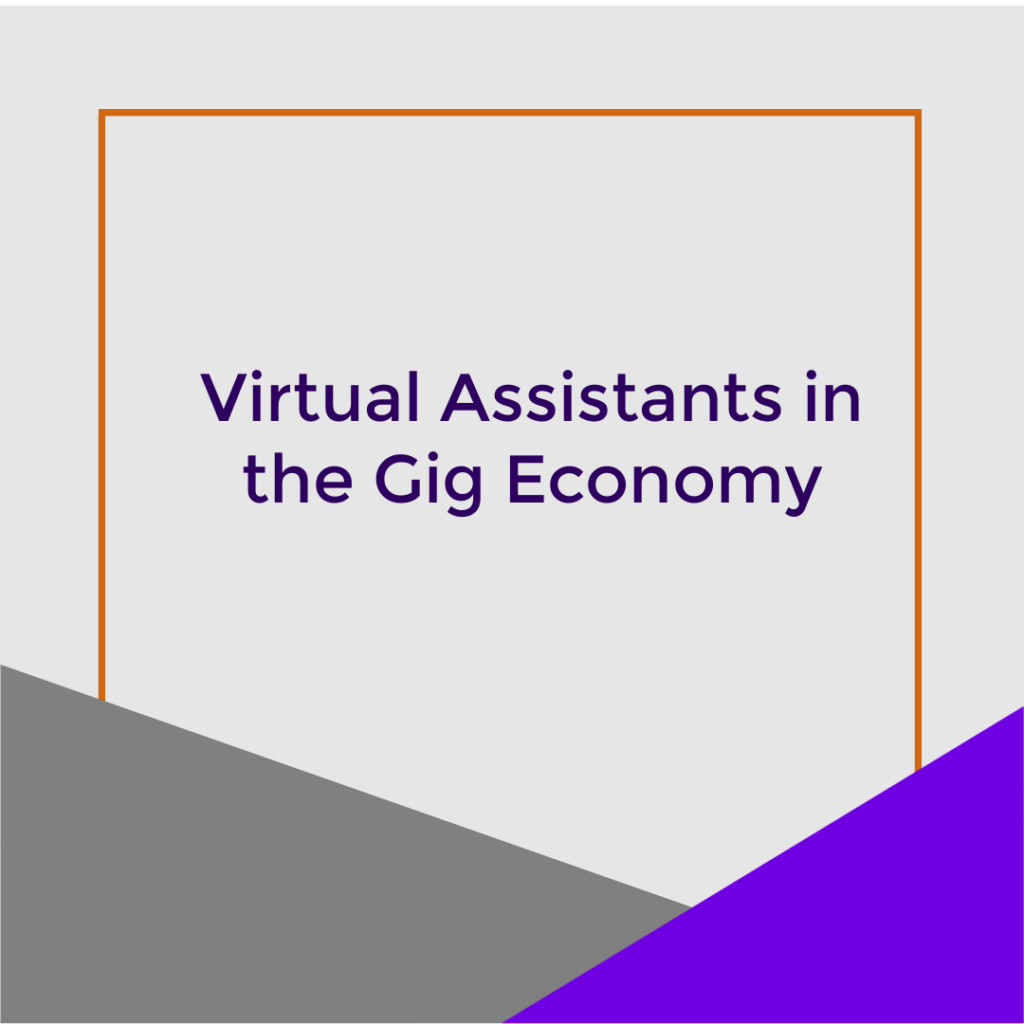Virtual Assistants in the Gig Economy provide valuable virtual services ranging from email management to social media support and project management. In other words, tasks that Virtual Assistants always provide.
What is the Gig Economy?
The Gig Economy refers to the ability to pick up what are normally quick/short jobs known as gigs. Many people think of the Gig economy only in terms of physical tasks like ride-sharing through Uber or Lyft, personal shopping using platforms like Instacart, and handyman services or other in-person services booked through Taskrabbit or other online marketplaces.
In reality, there are also marketplaces for virtual gigs, and these play well into the work of a Virtual Assistant.
Learn More about Popular Services Provided by Virtual Assistants
Marketplaces for Virtual Assistants
The two most popular marketplaces for Virtual Assistants are Fiverr and Upwork. Both allow you to create a profile and sell your services. Their terms of service differ, so you want to pay attention to make sure you aren't breaking any rules while working through one of these services.
With any marketplace or other online service you use, like payment processors, make sure to read and understand the Terms of Service. When working online and registering for online services, we are bombarded with accepting Terms of Service, sometimes to the point where people click without digging into the details.
In cases where your income depends on the Terms of Service, make sure you read and understand what you are agreeing to. Failure to comply with the terms can allow them to hold your funds back and can get you banned from the platform.
Fiverr Marketplace for Virtual Assistants to Find Gigs
Fiverr allows you to create a profile and sell gigs. Note that certain services are only available to Pro users or those who have already proven themselves on the platform, so make sure that you are able to provide what you want to before spending time creating your profile information.
As of 8/22/22, Fiverr's terms of service exclude any sharing of files or information outside of the Fiverr platform.
“All information and file exchanges must be performed exclusively on Fiverr's platform.”
Earlier this year, when I first noticed these terms, I contacted Fiverr to confirm the specifications that I could not allow someone, even with one of their ongoing gigs, to access my Project Management portal to share assets.
While I understand the concerns with security and privacy, this limitation makes it impossible for me and some others to use Fiverr for anything other than one-off gigs because having to enter everything separately into their platform when it already exists within a team setting is inefficient.
Upwork Marketplace for Virtual Assistants to Find Gigs
Upwork provides similar services to Fiverr, allowing you to create a profile and provide services for others. Like Fiverr, it has a rating system.
It is much easier to provide ongoing services on Upwork in that you can have an ongoing relationship with someone whom you pay hourly or per task. You send them the task, and when they are complete, they file the amount owed, and Upwork charges your credit card. This can be beneficial if you have ongoing work instead of a single or recurring gig of a single type.
Learn More about Popular Services Provided by Virtual Assistants
Other Marketplaces for Virtual Assistants
Other marketplaces that help Virtual Assistants find work include Freelancer and SpeedLancer. Stay tuned to learn more about other places to find work as a Virtual Assistant. In the meantime, keep an eye out for articles and information surrounding the Gig Economy.
Have You Tried Any of the Marketplaces?
If you have tried using any of the marketplaces, drop me a note in the comments and let me know your experiences.
Transcript of Video Virtual Assistant's Role in the Gig Economy
(00:02):
Hello, Virtual Assistants. It's Kim Shivler. Welcome. Today, we're gonna talk about the gig economy and virtual services and our role in that. So as we saw the popularity of ride-share services like Uber and Lyft, where people could just pick up a gig and work when they wanted to the term gig economy started being thrown around quite a bit, and it's very popular. People can do it easily as a side hustle. They can do it, um, full time for some people. And many times, though, people think mainly in terms of those physical services, like ride-share services, shopping through Instacart, and maybe even providing handyman services through something like TaskRabbit. Now, of course, each of these different marketplace platforms has its own rules and requirements. So if you're interested in exploring that you'll want to look at that platform. For us in the virtual world, they've also been, it's been very popular to do virtual services for a long, long time.
(01:23):
I've been working virtually since long before I'd even heard the term virtual assistant; when I had some of my first web development businesses in the nineties, while I might meet someone in person, most of the work was done remote, and some of it was a hundred percent remote, just like many of us do now. So we have that role in the gig economy where we're going to pick up gigs sometimes just a one off and sometimes ongoing gigs with the same customer. So for example, if you think of someone who does graphics, maybe initially you help someone with a logo that might be just a single gig, but then if they need ongoing help with content images, for example, their blog post, or maybe video thumbnails, these are things that my VAs help me with because it saves me a lot of time. Then we end up with not just the one gig but ongoing gigs. So there are multiple options here. Probably the two most popular marketplaces to find these type of gigs are Fiverr and Upwork. And I'm going to provide a little more information about them as well as links in the article, because both of them are a place where you can go, you can create a profile, you can upload your pricing, your information, the services you do,
(02:59):
And you can get gigs that way. They have rating systems. So people can see that you're rated high, and that helps you get gigs. If you, you know, make sure you're getting those good reviews, and then you also then get paid through that platform. So if I hire someone on Fiverr, I pay them through that platform. Now Fiverr and Upwork have some different rules, particularly for communication. Both you pay them through the platform, Fiverr, however, wants you to do all communication through the platform. Uh, they have some rules in their Terms of Service. I'm going to link to that. So if you end up with an ongoing gig, it can cause issues. For example, my Virtual Assistants work within my project management software and ongoing. They go in, they look at things, they pick up, uh, information, they share information with each other, even, and then I pay them through the platform. That technically is against the rules for Fiverr.
(04:13):
So I work more with Upwork for ongoing tasks. And I think that it may be set up to do that a little more in that Fiverr, you tend to be picking up a gig. If I want you to do something else, I have to ask you for a custom quote for that. And then that gig is completed. Whereas with Upwork, we can go through the platform and set something up where, uh, each week you were to do something and then you put in and get paid, uh, as you go through the work. So they both are great options when you're getting started. You likely want to start on both platforms and see what works for you. Either way, they are places for you to start getting gigs. And when you're first building your business, that is one of the most important things you can do. Again, there will be more information in the full article. And if you try either of these platforms, if you use them, please let me know in the comments, how, what was your experience? Uh, what were your successes? What were your challenges? I would love to hear about your experiences, getting gigs off of these type of marketplaces. And I'm gonna have a few extra bonus links here also with some other ideas for finding those gigs. I'm Kim Shivler. I'll see you next time. Bye.
Grab My Free Guide
10 Services that are In demand to Launch your Virtual Assistant Business


